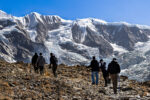What is climate change?
Climate change is a change in the usual weather. It could be a change in the rain or snow pattern or a place’s usual temperature for a season.
It is also a change in the earth’s climate or the earth’s usual temperature.
What needs to be understood is that while weather can change in just a few hours, the climate takes hundreds of years to change.
The earth’s climate has been constantly changing over geological time. Warming is occurring more rapidly than in the past. The natural fluctuation, or its variability, is being overtaken by rapid human-induced warming leading to serious implications for the earth’s climate.
How is climate different from weather?
Weather is the changes that we see, feel or witness outside each day. This could be a rainy day or could be sunny in a few hours. The weather can be cold or hot. In fact, weather varies from place to place.
Meanwhile, the climate is the usual weather of a certain place, and different in different seasons.
When we combine all the climates around the world together, that is the earth’s climate.
Changing the earth’s climate
Earth’s climate has been changing. There have been times when the earth’s climate has been cooler.
People studying earth see that its climate is getting warmer gradually. This means that the earth’s temperature has gone up by one degree Fahrenheit in the last 100 years. Even though this does not seem much, small changes in the earth’s temperature will have major big effects.
For example, warming of the earth’s climate has caused snow and ice to melt. It has also caused oceans to rise. Interestingly, the warming has changed the timing of the growth of plants.
Cause of the change
The main cause of climate change is the burning of fossil fuels like oil, coal that emits greenhouse gases into the atmosphere, mainly carbon dioxide. Human activities, such as deforestation and agriculture, too, contribute to the proliferation of greenhouse gases leading to climate change.
Several things can cause climate change. The earth’s distance from the sun can change because of which it sends out more or less energy to the earth. For example, the climate can change when a volcano erupts.
Scientists have to say that humans too change the climate. The energy that comes out from the vehicles, heaters, industries, coolers, fire, burning coals, oils, emissions, among others make an impact in the climate. These things send gases into the air which then cause the air to heat up leading to change the climate of a certain place. Consequently, this will change the earth’s climate.
Scientists view that the earth’s temperature will continue to increase for the next 100 years causing more snow and ice to melt, and oceans would rise. Several places would get hotter while some might have colder winters or some might get more rain, and some will witness droughts.
Greenhouse effect
The greenhouse effect is the way the earth’s atmosphere traps energy from the sun. The solar energy radiating back to space from the earth’s surface is absorbed by the atmospheric greenhouse gases and is re-emitted in all directions.
This energy radiating back down to the planet heats the lower atmosphere and the earth’s surface.
People are adding to the natural greenhouse effect with gases emitted from industries and agriculture, which leads to trapping more energy thus increasing the temperature. This is generally referred to as climate change or global warming.
The carbon dioxide takes hundreds of years for it to return to pre-industrial levels. Moreover, there is only so much carbon dioxide that can be soaked up by natural reservoirs, for instance, the oceans.
The emissions of carbon dioxide mainly come from the burning of fossil fuels and cutting down carbon-absorbing trees. Greenhouse gases like methane and nitrous oxide are also released through human activities.
Effects of climate change?
Rising ocean levels contribute to greater storm damage. Likewise, warming ocean temperatures lead to frequent storms, rainfall, flooding or other natural disasters. This can also increase the severity of wildfires, threatens habitats, human and animals life, among other serious consequences.
What we can do?
Humans can do or contribute to stopping climate change. Using less energy, water, turning off lights or TVs, refrigerators, fans when one leaves the room. Planting trees can be the best way.









Comment